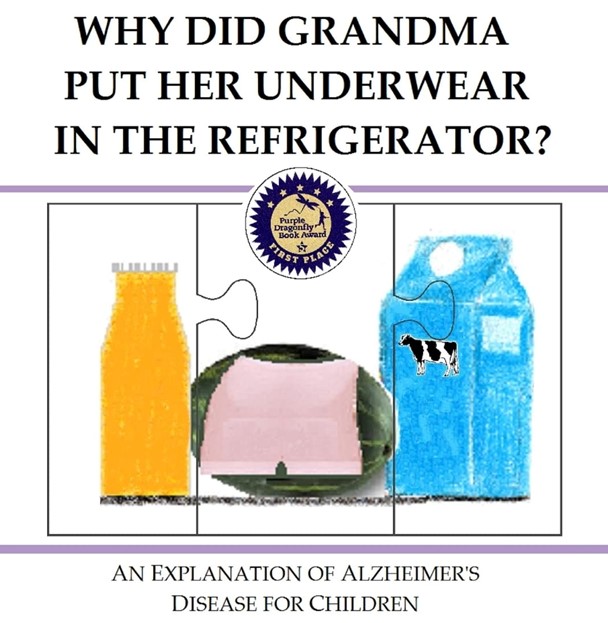Why Did Grandma Put Her Underwear in the Refrigerator?
Reading Guide

By: Max Wallack and Carolyn Given
About this Program
The MSU Extension Alzheimer's Dementia Awareness for ChildrenStorybook program is designed to teach children about a form of dementia.
The goals of the program are:
1) increase awareness and knowledge about Alzheimer’s (a form of dementia) and
2) provide supportive resources to children and families when they have a loved one
diagnosed with Alzheimer's.
The authors of this reading guide are:
- Veronica Baca, MSU Extension 4-H and Family Consumer Sciences Agent, Park County
- Marsha A. Goetting, MSU Extension Family Economics Specialist
- Keri Hayes, MSU Extension Program Assistant
Brief Summary
Julie has always loved spending time with her Grandma. They enjoy many activities
together like shopping, drawing and building puzzles. NowGrandma lives with Julie and her parents. This means they get to spend even more
time together. Sometimes Grandma has trouble remembering people's names or where
she put things. At times, Grandma doesn't remember who Julie is? When Grandma forgets,
Julie helps Grandma remember. She always tells Grandma she loves her. Julie's parents
explain to her "Grandmahas Alzheimer's and the cells in her brain can't always throw and catch messages the
way they should."
Julie's parents also tell her she is a good caregiver when she helps with Grandma.
Questions to Ask
- Julie loves to spend time with Grandma.What are some of their favorite activities?
- Sometimes Grandma can't remember where she put things.Why did Julie think it was her fault?
- Julie was worried that she might catch Alzheimer's from Grandma.What did her parents compare Alzheimer's with so Julie could understand it?
- Julie's Mom says she is very proud of her because she is a good caregiver.What are some of the things Julie does to take care of Grandma?
- There is one thing Grandma doesn't forget how to do.What does Julie say Grandma never forgets?
Common Reactions
- Confused:Children may feel confused when they see someone with Alzheimer's act in strange ways.
- Angry: Children may get angry when they do not understand what they did wrong or when they know the person with Alzheimer's is upset with them.
- Helpful: Children may want to help take care of someone they love who has been diagnosed with Alzheimer's.
Activity Enrichment
-
Memory Activity Book: Sometimes people with Alzheimer's and their family members benefit from a memory book. Create a notebook or bound journal with a series of drawings or printed photographs. Be sure to use short captions and dates to help with remembering. Look through this memory book together as a reminder of the activities enjoyed and memorable moments shared together. This book can strengthen the connection between a child and a loved one with Alzheimer's.
-
Identifying Emotions Activity: Think about a time when you lost a favorite toy or a time when you didn't get to do something you wanted to do. How did that make you feel? Julie takes walks with Grandma to make her feel better. What is an activity that makes you feel better when you're having a difficult day?
Other Storybooks and Reading Guides
Other Storybooks and Reading Guides can be found at: https://www.montana.edu/extension/alzheimers/booksandreadingguides.html
Funding for purchase of the storybooks in this program have been made possible by
a grant from the Montana Geriatric Education Center at the University of Montana,
AARP Montana, and by the Endowment fund from National Extension Association of Family
& Consumer Sciences (NEAFCS).



